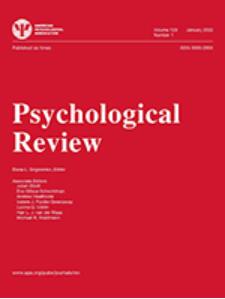How beliefs persist amid controversy: The paths to persistence model.
IF 5.8
1区 心理学
Q1 PSYCHOLOGY
引用次数: 0
Abstract
On controversial issues from abortion to vaccination, we frequently know that millions disagree with us, yet remain firmly rooted in our beliefs. What enables this capacity to sustain controversial beliefs amid societal disagreement? To answer this question, we connect insights across the social sciences to develop the paths to persistence model (PPM). The PPM outlines four causes of persistence amid societal dissent: People may perceive disagreeing others as more ignorant, biased, or unintelligent than themselves or those who agree (informational path), consider the issue to be subjective or unknowable (ontological path), expect changing their beliefs to have bad social or personal consequences (functional path), or fail to deploy the cognitive resources to update their beliefs (computational). We explain how the PPM integrates previous theories across disciplines into interacting "paths" that jointly explain persistence. We then present a preregistered study with a sample quota-matched to the U.S. census on race and sex (N = 1,250) investigating responses to societal disagreement on 96 issues spanning science, politics, morality, and religion. We find that most participants persist in their beliefs amid controversy-even when they learn that they vastly underestimated the extent of societal dissent. Moreover, we find that the paths jointly predict whether people persist and are associated with important social outcomes, such as people's willingness to befriend disagreeing others. Four additional preregistered open- and close-ended studies (N = 1,921) support these findings and our theoretical model. (PsycInfo Database Record (c) 2025 APA, all rights reserved).信仰如何在争议中持续:通往持续模式的路径。
在从堕胎到疫苗接种等有争议的问题上,我们经常知道,数百万人不同意我们的观点,但仍坚定地坚持我们的信念。是什么使这种能力在社会分歧中维持有争议的信仰?为了回答这个问题,我们将跨社会科学的见解联系起来,以开发持久性模型(PPM)的路径。PPM概述了在社会异议中持续存在的四个原因:人们可能认为持不同意见的人比他们自己或同意的人更无知、有偏见或不聪明(信息路径),认为问题是主观的或不可知的(本体论路径),期望改变他们的信仰会产生不良的社会或个人后果(功能路径),或者未能部署认知资源来更新他们的信仰(计算路径)。我们解释了PPM是如何将以前的跨学科理论集成到相互作用的“路径”中,这些“路径”共同解释了持久性。然后,我们提出了一项预先登记的研究,其样本配额与美国种族和性别人口普查(N = 1,250)相匹配,调查了在科学、政治、道德和宗教等96个问题上对社会分歧的反应。我们发现,大多数参与者在争议中坚持自己的信念——即使他们知道自己大大低估了社会异议的程度。此外,我们发现这些路径共同预测了人们是否会坚持下去,并与重要的社会结果相关联,比如人们与持不同意见的人交朋友的意愿。另外四项预注册的开放式和封闭式研究(N = 1921)支持这些发现和我们的理论模型。(PsycInfo Database Record (c) 2025 APA,版权所有)。
本文章由计算机程序翻译,如有差异,请以英文原文为准。
求助全文
约1分钟内获得全文
求助全文
来源期刊

Psychological review
医学-心理学
CiteScore
9.70
自引率
5.60%
发文量
97
期刊介绍:
Psychological Review publishes articles that make important theoretical contributions to any area of scientific psychology, including systematic evaluation of alternative theories.
 求助内容:
求助内容: 应助结果提醒方式:
应助结果提醒方式:


